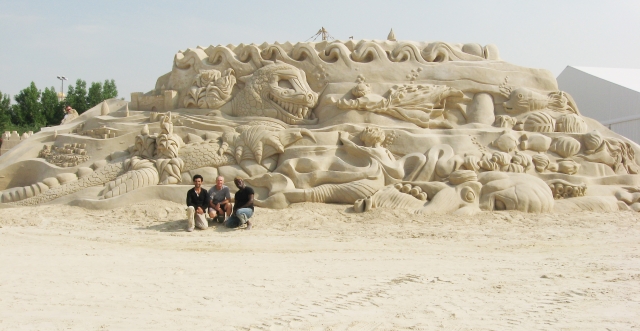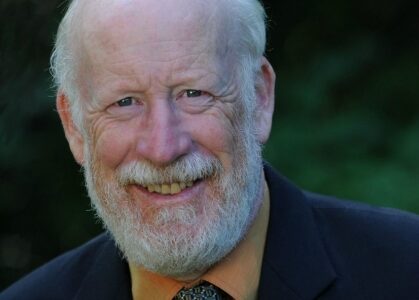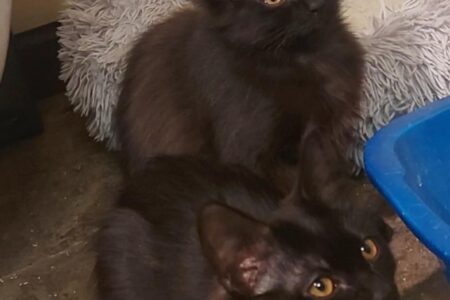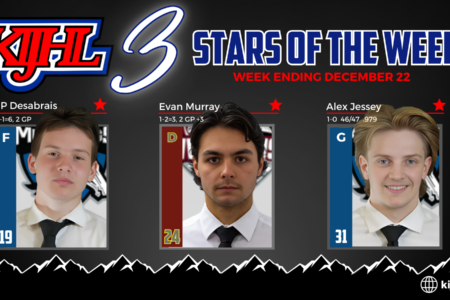Selkirk College Instructor Helps Bring 1001 Arabian Nights to Life Through Sand
It’s the world’s biggest sand sculpture project, but Mother Nature almost destroyed it before it could come to life.
Earlier this winter Selkirk College instructor Denis Kleine was part of an international effort that brought more than 60 sand sculptors to Kuwait City to build a massive temporary theme park called 1001 Arabian Nights. Representing 24 countries, the task of the world’s elite sand artists was to create almost 80 sculptures as part of the Remal International Sand and Light Festival.
Two weeks into the project an unusual rain storm hit the Arabian Peninsula, dumping three times the amount of average monthly rainfall in one afternoon.
“After it stopped we walked out and it was a lake… it was a disaster,” says Kleine. “It was so disheartening for everybody to have to go back in and recreate something that will never be the same. But we did it and in the end we saved it.”
Opportunity of Lifetime
Kleine first heard about the monumental Middle East project this past summer. Victoria-based designer Damon Langlois—one of Kleine’s friends in the sand sculpture world—was heading up a project hosted by Kuwait’s technology industry and was looking for the planet’s most talented sculptors.
The prospect of creating detailed sculptures out of 30,000 tonnes of sand in a part of the world the well-traveled Kootenay Studio Arts casting instructor had never been was exciting. He quickly signed on.
“I love to travel and having the opportunity to see new countries,” he says. “Working on a massive project like that was a great opportunity. The energy of the group was quite magical.”
The Right Stuff
Kleine moved to the Nelson area in Grade 1 and has spent most of his 57 years in the Kootenays. In 1983 he graduated with a BFA from the former David Thompson University in Nelson with a major in sculpture. He has been a professional artist ever since.
Kleine sells his pieces in galleries and does commission work. Residents of the West Kootenay will recognize his talents as the artist behind the osprey sculpture in the bay between Nelson’s Chahko-Mika Mall and the playing fields, and The Family sculpture across the street from Trail’s Cominco Arena.
After a ten-year stint in Kelowna starting in the mid-1980s, Kleine moved back to Nelson in 1996. Shortly after returning, he added educator to his resume when took on the position of casting instructor at Kootenay Studio Arts—then known as Kootenay School of the Arts.
In 1989 Kleine entered the world of snow sculpture by entering competitions in British Columbia, across Canada and around the world. Snow progressed to ice, which then led to sand. Today Kleine is one of the most accomplished and sought after talents in sand sculpture.
“It’s not my serious art. I’m proud of it, but it’s more of a job you are doing for somebody,” he says. “For me it’s an opportunity to create big pieces fast and to rub shoulders with other artists from around the world. The biggest thing for me is getting to travel and see the world.”
A Whole New Level
The 1001 Arabian Nights project is located in the middle of Kuwait City and occupies an area the size of four soccer fields, or about 28,000 square metres. After several weeks of preparation work done prior to the arrival of the 65-person sculpture team, it took seven weeks to build.
“The first four weeks was like going to an industrial site,” who spent six weeks on the project, including all of November. “There was machinery going all the time, the thumping of the packing of the forms, people building wooden forms, big front-end loaders, huge dump trucks coming in all the time… there was so much construction going on it was incredible. We would just be in our little areas that we thought we would never finish.”
Some of the creations were almost 15 metres high (49 feet) and the design work was elaborate. At the direction of Langlois, the sculptors would set to work on pre-designed pieces, usually in teams of two and three people. Though the sculptures were specific to the overall theme, Kleine said there were opportunities for creative freedom within the individual pieces.
With very little public art in the Muslim nation, the project attracted plenty of attention from residents, media and dignitaries. During the creation phase they were paid visits by the assistant to Kuwait’s Emir Sabah Al-Ahmad Al-Jaber Al-Sabah, the Canadian ambassador, the US Ambassador and the Dutch Ambassador.
“I think what I will take away is that I was grateful to be in that part of the world and learn more about the Muslim ways,” says Kleine, reflecting on his six weeks. “I also learned a lot working with all the amazing artists I had the opportunity to work with… there is a lot of talented people out there. It’s humbling to be part of that group.”
After the sculptors were finished a crew came in to light the area, lay down paving stones and add water features. A restaurant area was added, a children’s maze created and performance space included in the final layout. The Remal International Sand and Light Festival is scheduled to open later this month and is expected to attract visitors until April.
























